Governing Uranium
DIIS – Danish Institute for International Studies is currently leading a global project focusing on the governance of the production and trade of natural uranium. The ‘Governing Uranium’ project seeks to address the limited international guidance that currently applies to the front end of the nuclear fuel cycle (up to the point of conversion) by providing policy recommendations for improving transparency, regulation and best practice. With researchers participating in the project from Washington D.C. to Islamabad and from Sweden to South Africa, the project is able to identify not only the national regulatory systems within major supplying and consuming countries but also industry best practice globally.
Ranger Uranium Mine, east of Jabiru, Northern Territory. Photo by Cindy Vestergaard, taken on 2 June 2013
Research and activites
-
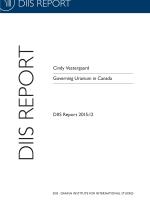
-
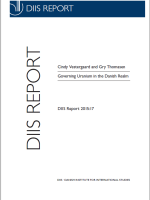 DIIS Report2016Cindy Vestergaard & Gry Thomasen
DIIS Report2016Cindy Vestergaard & Gry Thomasen -
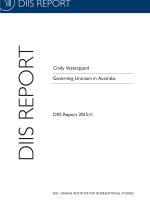
-
 Photo/illustration by Pexels. Jens Mahnke. copyright license
Photo/illustration by Pexels. Jens Mahnke. copyright license -
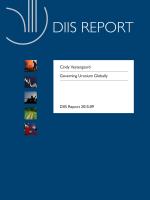
-
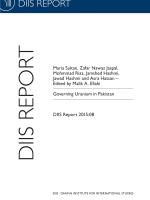 DIIS Report2015Maria Sultan, Zafar Nawaz Jaspal, Mohmmad Riaz, Jamshed Hashmi, Jawad Hashmi, Asra Hassan, Malik A. Ellahi & Cindy Vestergaard
DIIS Report2015Maria Sultan, Zafar Nawaz Jaspal, Mohmmad Riaz, Jamshed Hashmi, Jawad Hashmi, Asra Hassan, Malik A. Ellahi & Cindy Vestergaard -
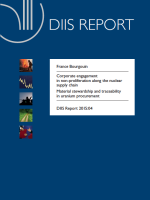 DIIS Report2015Material stewardship and traceability in uranium procurementCindy Vestergaard
DIIS Report2015Material stewardship and traceability in uranium procurementCindy Vestergaard -
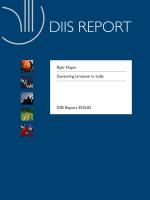 DIIS Report2015Rajiv Nayan & Cindy Vestergaard
DIIS Report2015Rajiv Nayan & Cindy Vestergaard -
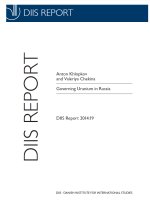 DIIS Report2014Anton Khlopkov, Valeriya Chekina & Cindy Vestergaard
DIIS Report2014Anton Khlopkov, Valeriya Chekina & Cindy Vestergaard -
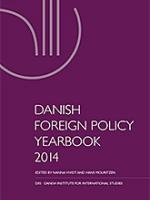
-
DIIS Report2014Cécile Padova, Bruno Tertrais & Cindy Vestergaard
-
Report2014A report of the CSIS Proliferation Prevention Program
-
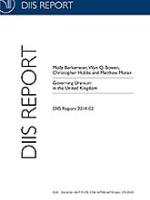 DIIS Report2014Molly Berkemeier, Wyn Q. Bowen, Christopher Hobbs, Matthew Moran & Cindy Vestergaard
DIIS Report2014Molly Berkemeier, Wyn Q. Bowen, Christopher Hobbs, Matthew Moran & Cindy Vestergaard -
Journal Article2014the Danish experience in NATOCindy Vestergaard
-
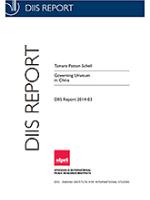 DIIS Report2013Tamara Patton Schell & Cindy Vestergaard
DIIS Report2013Tamara Patton Schell & Cindy Vestergaard -
Policy Paper2013From Proliferation Risk to Non-proliferation Opportunity
-
Journal Article2013the case of arctic yellowcakeCindy Vestergaard
-
 Photo/illustration by Pexels. Jens Mahnke. copyright licenseDIIS Comment2016The political basis for legislation on dual-use exports is now in placeCindy Vestergaard & Gry Thomasen
Photo/illustration by Pexels. Jens Mahnke. copyright licenseDIIS Comment2016The political basis for legislation on dual-use exports is now in placeCindy Vestergaard & Gry Thomasen -
 Photo/illustration by Pexels. Jens Mahnke. copyright licenseDIIS Comment2016A stepping stone to legislationCindy Vestergaard & Gry Thomasen
Photo/illustration by Pexels. Jens Mahnke. copyright licenseDIIS Comment2016A stepping stone to legislationCindy Vestergaard & Gry Thomasen -
 Photo/illustration by Pexels. Jens Mahnke. copyright licenseDIIS Comment2016Greenland retains control over mining, environment and safety, Denmark over non-proliferationCindy Vestergaard & Gry Thomasen
Photo/illustration by Pexels. Jens Mahnke. copyright licenseDIIS Comment2016Greenland retains control over mining, environment and safety, Denmark over non-proliferationCindy Vestergaard & Gry Thomasen -
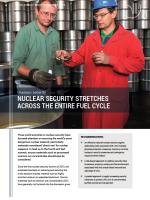 DIIS Policy Brief2015Uranium SecurityCindy Vestergaard
DIIS Policy Brief2015Uranium SecurityCindy Vestergaard -
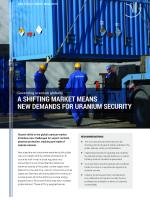 DIIS Policy Brief2015Governing Uranium GloballyCindy Vestergaard & Mette Moth Henriksen
DIIS Policy Brief2015Governing Uranium GloballyCindy Vestergaard & Mette Moth Henriksen -
 Photo/illustration by Pexels. Jens Mahnke. copyright license
Photo/illustration by Pexels. Jens Mahnke. copyright license -
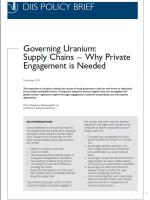 DIIS Policy Brief2014Supply chains - why private engagement is neededFrance Bourgouin, Julia Panzer & Cindy Vestergaard
DIIS Policy Brief2014Supply chains - why private engagement is neededFrance Bourgouin, Julia Panzer & Cindy Vestergaard -
-
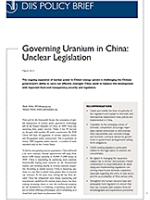 DIIS Policy Brief2013unclear legislationMark Hibbs, Tamara Patton Schell & Cindy Vestergaard
DIIS Policy Brief2013unclear legislationMark Hibbs, Tamara Patton Schell & Cindy Vestergaard -
-
DIIS Policy Brief2012Cindy Vestergaard
